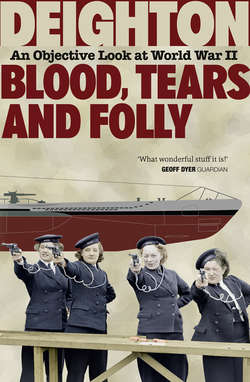Читать книгу Blood, Tears and Folly: An Objective Look at World War II - Len Deighton - Страница 48
Hitler and anti-Semitism
ОглавлениеHitler was not the first politician to foment anti-Jewish hatreds for political ends. In 1887 an International Anti-Jewish Congress had been organized in Dresden. More such gatherings had taken place in Kassel and Bochum in 1886 and 1889.17 By 1895 anti-Semites were virtually a majority in Germany’s lower house, while in Vienna, Karl Lueger’s anti-Jewish Christian Socialists had 56 seats against 71 Liberals. In France the persecution of Captain Alfred Dreyfus revealed anti-Semitism no less deeply seated.18 A motion in the Senate that would have banned Jews from public service in France was defeated 268:208.
A native of Austria, Hitler centred his political activities upon Bavaria in southern Germany. Always deliberately vague about his political aims and intentions, he artfully used many local prejudices to win support. Berlin bureaucrats ruled the new unified Germany. He attacked the remoteness of the heartily detested central government. He blamed the generals – conveniently regarded as Prussian Protestants – for losing the war. In Catholic Bavaria, traditionally resentful of Prussian attitudes, these views found warm support.
Hitler’s vaguely defined anti-Semitism enabled the small farmer to hate the bank to whom he owed money, the small shopkeeper to hate the department store against which he competed. More intelligent Germans were convinced that these rabble-rousing simplifications were temporary measures. They firmly believed that once the Nazis turned their eyes away from Munich, Bavaria, to focus attention on the real seat of power in Berlin, such vicious anti-Semitism would tone down and fade away.
These hopes that Hitler and his Nazis would become moderate and statesmanlike were illusory. Hatred of Jews was Hitler’s whole motivation. His campaign against Jews became more and more murderous and demented right up to the time of his death. He fanned ancient irrational fears of Jewish international conspiracies. This gave him the excuse to put peacetime Germany into a permanent state of emergency. That ‘war footing’ was what gave the Nazi party such tight control of all aspects of the life of every German.
Albert Speer provides a revealing memory of Adolf Hitler:
He jumped from one subject to another, frequently repeating words like ‘fundamental’, ‘absolutely’, ‘unshakeable’. Then too he had a special fondness for phrases and words out of the days of the beer-hall brawls, such as ‘club down’, ‘iron perseverance’, ‘brute force’, or ‘beat up’, as well as scatological words like ‘shithead’, ‘crapper’. In moments of excitement he also tended to phrases like: ‘I’ll finish him off myself’; ‘I’ll personally put a bullet through his head’; or ‘I’ll fix him.’19
